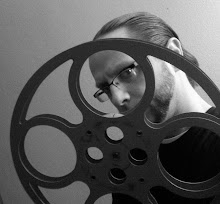The first thing that needs to be said about Quentin
Tarantino’s DJANGO UNCHAINED is this: it is not a new film. It is instead a
large collection of Tarantino’s favorite film genres; recycled and refurbished
as the driving force in an Old West backdrop. But DJANGO should not be judged
upon that and that alone. The recycling of old ideas are the tools by which
Tarantino chooses to tell his story. How well he uses those tools is how DJANGO
should be judged.
Two years before the Civil War, Django (Jamie Foxx) is a
slave who is taken under the wing of Dr. Schultz (Christoph Waltz), a bounty
hunter who needs him to complete a job. Once the job is complete, Schultz
decides to assist Django in freeing his wife Broomhilda (Kerry Washington), who
is a slave under the ownership of Calvin Candie (Leonardo DiCaprio) and his
butler Stephen (Samuel L. Jackson).
DJANGO UNCHAINED is saturated in film lore. The film starts
off as a Spaghetti Western, evolves into a Buddy-Cop flick, transforms into a
Men-on-a-Mission movie, and then wraps with a Man-on-a-Reckoning/Vengeance
tale; all with a sprinkle of BLAZING SADDLES here and there. This is Quentin Tarantino unleashing his
favorite things in such a heavy-handed manner you often wonder if he will show
up on screen and begin drawing circles with chalk around all the references.
But the question for DJANGO is if this approach works as a
storyteller. It does; for exactly one-half of the movie. DJANGO starts off very
strong; setting up such a great Old West atmosphere it would not be a shocker
to see Clint Eastwood show up in an old parka. There are moments of brilliance
in DJANGO by way of making the many genres work for the story. However, for
every single moment of brilliance there are five dumb ones. DJANGO too often
falls into overlong scenes with too much talking and no payoff, leading to a
lack of energy and urgency which borders upon dullness. The second act going
into the third is where this problem is very apparent, as Django himself
becomes an observer in his own character story. And speaking of character that
is where DJANGO falls on its face. For as much talking as everyone does, there
is no true development for anyone; everyone is very one-dimensional, which
means there is no reason to care who gets shot, hung or castrated by movie’s
end.
Tarantino deserves credit for tackling a touchy subject
(slavery) with such brutal honesty. Nothing is held back. Nothing. The film is
beautifully shot (although not overly remarkable), the gun-battles are fun
(although the bloodshed is ridiculously exaggerated), and Tarantino’s skill for
sharp dialogue continues to shine. However, Tarantino just can’t help himself
at times. The film too often features music from the 1970’s era; everything
from Jim Croce to Johnny Cash. The out-of-place music jolts you out of the Old
West and makes the film feel like a light parody. The worst mistake made was
the awful and tasteless inclusion of a gangster-rap song during a climatic
gun-battle. For a director who claims to love the Old West genre so much, he
oddly doesn’t think twice about taking a dump all over it.
The cast seems to be having fun with their roles, and they
are equally fun to watch; perhaps a little too much fun as everyone seems to
know that the entire run is tongue-in-cheek. The best work is done by DiCaprio
and Jackson, who have great chemistry together for as much as their interesting
character dynamic is allowed to grow.
There are several ways to look at DJANGO. As homage to the
past it’s great. As an Old West film, its priority is in style, and not in
transporting you to another time. As a Quentin Tarantino film it doesn’t quite
have the zip of his prior works. As an overall movie, its shortcomings in
character and energy are too much to overcome. A real shame, because this shoulda
been a contender.
BOTTOM LINE: Rent it

No comments:
Post a Comment
A few rules:
1. Personal attacks not tolerated.
2. Haters welcome, if you can justify it.
3. Swearing is goddamn OK.